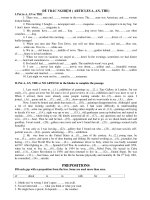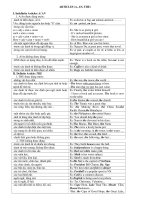articles a an and the eg40
Bạn đang xem bản rút gọn của tài liệu. Xem và tải ngay bản đầy đủ của tài liệu tại đây (105.88 KB, 3 trang )
English Banana.com
Test Your Grammar Skills
When to Use Articles – a / an & the
For more fun tests, quizzes and games log onto www.englishbanana.com now!
There are three articles in the English language – a / an and the.
They are often used in sentences before nouns that are common and countable.
Examples
sugar is common but uncountable I like sugar in my tea. not
I like a sugar in my tea.
France is a proper noun I went to France on holiday this year. not
I went to the France on holiday this year.
coat is common and countable I bought a coat yesterday.
But do I use a / an or the?
a / an (indefinite articles)
•
We
use a / an when it is the first time that we refer to something:
“This morning I bought a book.”
•
We
use an when it is the first time that we refer to something which starts with
a
vowel sound:
“Thi
s morning I bought an apple.”
the (definite article)
•
We
use the when we have already introduced the thing (noun)
:
“Thi
s morning I bought a book.” “Have you started the boo
k yet?” “No, not yet.”
We kno
w which book you are talking about – it has become “the book”, a specific book, rather
than “any” book.
•
We
use the
when the thing is something specific:
“What is th
e name of the girl who won X Factor last year?”
There was only one girl who won it and she had a specific name.
•
We
use the when both of you know which thing you
mean:
“Ho
w do I get to the airport?”
You both know which airport you are talking about – you wouldn’t be on your way to an – to
any – airport…!
English Banana.com
Test Your Grammar Skills
When to Use Articles – a / an & the
For more fun tests, quizzes and games log onto www.englishbanana.com now!
•
Compare the following two senten
ces:
“I’m going to the cine
ma later.”
You both know which cinema – probably the one nearest to you.
“I’m going to a cinema later.”
You don’t know which one and it is not important which one. It could be any cinema.
•
We
use the before a superlative adjective
:
“Thi
s has been the best day of my life.”
Some Example Errors:
“I live in the house in Bristol.”
There is more than one house in Bristol! Use “…a house…”
“What’s a phone number for the swimming pool?”
The swimming pool has only got one phone number – a specific number. Use “…the phone
number…”
•
We
use a when we talk about frequency
or quantity:
“On
ce a week.”
“Three times a day.”
“92 pence a litre.”
•
We
use a / an to show that somebody or something is
part of a group:
“Loui
se is a teacher.”
“Brian is a crossword addict.”
“My car is an old blue Vauxhall Corsa.”
• If the thing has one or more modifier before it – e.g. an adjective or an intensifie
r –
the article g
oes before the first modifier:
“It was a great party.”
“My grandma had a really lovely day.”
English Banana.com
Test Your Grammar Skills
When to Use Articles – a / an & the
For more fun tests, quizzes and games log onto www.englishbanana.com now!
•
Uncountable nouns don’t need an article
in front of them:
“Would you li
ke wine with your meal, madam?” not
“Would you like the wine with your meal, madam?”
• Proper nouns don’t usually need an articl
e in front of them:
“I work at Starbu
cks.” not
“I work at the Starbucks.” but
“I work at the Starbucks in the market place.” (A specific Starbucks coffee shop.)
• There are some exceptions to this rule
:
“I went to the United States on bu
siness last month.”
When the proper noun is made up of an adjective + noun (e.g. “United” = adjective +
“Kingdom” = noun) we need to use the definite article:
“I live in the United Kingdom.”
• If you are talking about things in general terms, you don’t need an ar
ticle:
“I love cats. T
hey are really friendly.” not
“I love the cats. They are really friendly.” but
“I love the cats from next door. They are really friendly.” (Specific cats.)
“She eats sweets all the time.” not
“She eats the sweets all the time.” but
“She eats the sweets that belong to her brother all the time.” (Specific sweets.)









